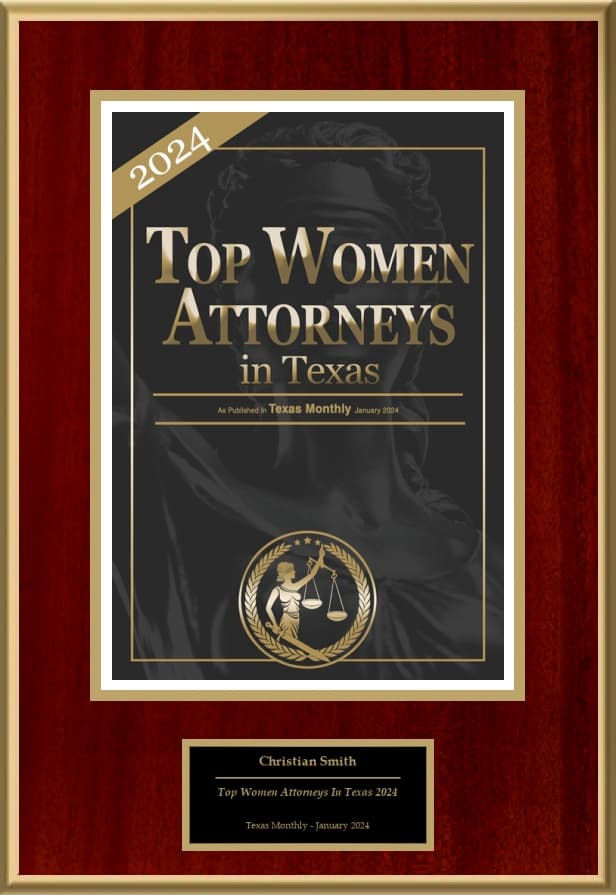the Courtroom
Family law issues can be incredibly stressful. Our award-winning team is here to stand by you and get the outcome you deserve.
Award-Winning Advocates Who Stand Behind You
With a high level of understanding, precision, and skill, our law team is ready to take on challenging cases with the goal of ensuring our clients get the outcomes they deserve.











Family Law Cases We Take
At Smith & Bledsoe Family Law, we have over 25 years of combined legal experience representing Texas clients in a range of family law matters, including:
Premarital Agreement
A premarital agreement (prenup) is a contract two people sign before marriage. It outlines how to handle a number of items in a divorce, such as dividing assets, debt protection, marital duties, and more. Smith & Bledsoe Family Law can guide you in drafting a legally enforceable agreement suited to your needs.
Post-Marital Agreement
A post-marital agreement is similar to a prenup but is a document you execute after marrying your spouse. It offers numerous protections if you divorce or your spouse dies unexpectedly.
Divorce
Going through a divorce is emotional and stressful. You might struggle to negotiate the terms with your ex. That’s where we can step in to protect your interests and fight for what you deserve.
Uncontested/Agreed Divorce
An uncontested divorce means both spouses agree to the legal issues involved in dissolving the marriage. Although it simplifies the process of dissolving a marriage, hiring a family law attorney can be beneficial.
Child Custody
In Texas, the legal term for child custody is conservatorship. The courts base their decision on the child’s best interests. At Smith & Bledsoe Family Law, we help clients understand their rights and navigate child custody arrangements.
Child Support
Typically, the parent who doesn’t live with the child primarily is the one to pay child support. However, that doesn’t necessarily mean the other parent isn’t responsible for the costs of raising a child. A specific guideline determines the amount the supporting parent must pay to provide for their child.
Family Law Order Modification
You can modify court orders related to family law matters under specific circumstances. One of our family law attorneys can determine if you meet the requirements of order modification and provide the necessary guidance.
Family Law Order Enforcement
Sometimes, one party to a family law order doesn’t fulfill their obligations. When that happens, you might have to take the case to court for a judge to enforce the order. We can help you file a motion and represent you during legal proceedings.
Protective or Restraining Order
A temporary restraining order or protective order can keep you safe when you or your child is the victim of family violence. It initiates the legal process of prohibiting a specific person from contacting you for a predetermined period.
Estate Planning
Estate planning is essential to protect your interests and outline the proper distribution of your property when you die. We can review your estate and determine the elements to incorporate, such as end-of-life planning, guardian appointments for minor children, beneficiary designations, and trust creation.
Wills and Trust
A well-prepared will or trust protects your assets and ensures your loved ones’ financial futures. Let us draft these documents to prevent confusion or disagreements over the validity of your will.
Adoption
Expanding your family is exciting. However, you must follow specific procedures to avoid unnecessary delays and roadblocks. A family law attorney can help you complete and file the paperwork, prepare for the home study, and navigate all other stages of the process.
LGBT Family Law
Members of the LGBT community have always had challenges receiving recognition in family law matters. Let a family law attorney help protect your rights.
Family Law Attorneys in Austin, Texas
Divorce and other family law matters often stir up strong feelings and create challenges while you are negotiating terms. It can be financially and emotionally draining. You should not have to handle the legal aspects of your case alone.
Smith & Bledsoe Family Law will be your advocate and aggressively pursue a favorable outcome. You can count on our award-winning team to work hard to meet your needs and goals. Call us at (512) 277-3166 today for a free case evaluation to learn more.

Testimonials

“Michael “Em” Araj is an excellent advocate for clients. As an attorney myself, I can honestly say that they are one of the select few that I would hire to represent me. 5 stars is not enough”

“I made the right decision choosing to work with this firm. Tyler was my lead attorney and was clear, calm, and always one step ahead. I knew I made the right choice because I never felt like just another case. When he wasn’t available one of the other attorneys or support staff would pick up the ball to assist me in any emergency. Everyone at the firm truly cared and fought for what mattered to me. I’m so grateful to have had them in my corner.”

“Michael Araj was a pleasure to work with. He was personable, kind and quick to respond to questions and needs. I would highly recommend this firm.”

“The team of attorneys and paralegals at Smith & Bledsoe Family Law are outstanding. I had the opportunity to work with two of their lawyers, Nikki Chapa and Austin Trainor. While working with multiple attorneys can often be frustrating, and confusing, that wasn’t the case here. I never had to repeat the facts of my case or story multiple times, they were both fully briefed on my situation from the start. The entire process was made smooth and stress-free, and their support was incredibly reassuring. Holly and Eliza were also invaluable, always available to answer my questions and address any concerns. Both are tremendous assets to the firm. I highly recommend their team.”

“This review is for Austin Trainor. He is truly a brilliant, hard working lawyer who takes great care of his clients! Very trustworthy, observant, quick-witted and always on the ball. I would recommend him if you’re ever in need of legal services. He’s the best!”

“I had the pleasure of speaking with Ms. Nikki Chapa. I have never met someone so attentive and willing to help. Her confidence puts ALL my worries at ease. I couldn’t be more thrilled to have her on my side. Let this be a warning in the best way.. She’s a beast!”
About The Firm
An Overview of the Divorce Process in Texas
A no-fault divorce is allowed if you can prove you and your spouse have lived apart for at least three years before filing.
You can use your spouse’s confinement to a psychiatric hospital for at least three years with little to no chance of recovering as grounds in a divorce.
A fault-based divorce involves one spouse blaming the other for misconduct such as:
An experienced Texas family law attorney can help you determine the grounds on which you should file for divorce.
Dividing Assets During a Divorce
Texas is a community property state. That means each spouse owns community property equally. Family Code § 7.001 imposes a rule that the courts must divide property among divorcing couples in a manner that is right and just.
Community property is property either spouse acquires while married, such as:
- Jewelry
- Real estate
- Clothing
- Bank accounts
Separate property is the property that either spouse earns or receives before the marriage or while married as a gift, inheritance, or personal injury award. Each spouse is the sole owner of separate property. It is not subject to division during a divorce.
While determining what is right and just during property division, a judge might consider factors such as:
- Each spouse’s health
- Whether either spouse is at fault for the marriage ending
- Tax issues
- Differences in the spouses’ earning power
- Where either spouse acquired the property
- Future employability of each spouse
- Which spouse has custody of shared children
Contact Us
Understanding Child Custody and Support
The state’s public policy regarding child custody includes:
- Guaranteeing the child will have continuing and frequent contact with parents who show an ability to act in the child’s best interest
- Providing a nonviolent, safe, and stable environment for the child
- Encouraging each parent to share in the duties and rights of raising their child after dissolving the marriage or separating
In Texas, child custody is called conservatorship. You can petition for managing conservatorship, possessory conservatorship, or both during a divorce.
A managing conservatorship gives a parent authority to make essential decisions about their child’s education, medical needs, religious upbringing, and other aspects of their life. Possessory conservatorship refers to a parent’s right to have their child reside with them.
Typically, the parent who doesn’t primarily live with the child (noncustodial parent) is the one who provides the other parent with child support. However, that doesn’t mean the other parent (custodial parent) isn’t financially responsible for expenses. The law assumes the custodial parent pays for the daily cost of raising their child.
Frequently Asked Questions
At Smith & Bledsoe Family Law, we understand the complications you might face in a divorce. We have answered the most common questions clients ask to help you prepare.
What Are the Requirements to Get a Divorce in Texas?
According to Texas Family Code § 6.301, a married couple must meet two residency requirements to file for a divorce:
- Either spouse lives in the state for six months before filing the divorce petition
- Either spouse is a resident of the county where they file the divorce suit for 90 days before filing
Can I Pursue Alimony from My Ex?
Yes. In Texas, alimony is called spousal maintenance. According to Texas Family Code § 8.051, the court might order maintenance to the spouse seeking maintenance if they won’t have sufficient property after the divorce to meet their reasonable needs and:
- The spouse who would provide maintenance received deferred adjudication for or a conviction of a criminal offense involving family violence during the pending divorce case or within two years before filing the petition for divorce; or
- The spouse seeking maintenance was married to the other for at least ten years and is:
- Unable to earn sufficient income to provide for their reasonable needs,
- Can’t earn a sufficient income to provide for their reasonable needs due to an incapacitating mental or physical disability, or
- Is the custodial parent of a child requiring personal supervision and substantial care due to a mental or physical disability preventing the spouse from earning sufficient income to meet their reasonable need
How Do Texas Courts Calculate Child Support?
The courts multiply the paying parent’s net monthly income by a percentage according to the number of children included in the child support to determine the payment amount.
The Right Services to Meet Your Family's Needs
Whether it’s litigation, settlement, or something in the middle, we are dedicated to ensuring that your family receives the right services and performance for your unique goals.
Let us focus on your case so you can invest your energy back where it belongs – into yourself and your family.

Contact a Trusted Lawyer for Help
Seeking advice and support from an experienced family law attorney is crucial. Smith & Bledsoe Family Law can assist you with your divorce and resolve the disputes you face.
Call us at (512) 277-3166 for a free case evaluation if you have a family law issue to discuss.










